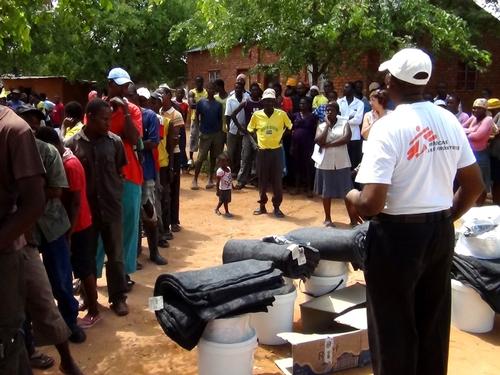Thousands of people in Mozambique, Malawi, South Africa and Zimbabwe have been displaced, as heavy rains in the eastern part of Southern Africa have led to flooding in the area of the Limpopo river. The situation seems most critical in Mozambique, where large areas of Gaza province remain inundated.
According to official figures, as of 28 January, 48 people have died, and 146,000 people have been displaced to almost 30 temporary shelters. In the town of Chokwe, although the waters are starting to recede, there are around 114,000 people in 10 temporary shelters.
“Chokwe gives the impression of a post-war scene, because the vast majority of the population has been evacuated to temporary shelters, mainly in Chaquelane,” said Lucas Molfino, Médecins Sans Frontières (MSF) medical coordinator in Mozambique. “In the city centre, there are obvious issues related to sanitation and public hygiene because of dirty stagnant water and dead animals lying in the streets.”
Medical supplies destroyed by floodwater
The two health facilities closest to the largest shelter have reported stock-outs of drugs and rapid diagnostic tests for malaria. Staff are attending to about 300 patients a day. There is no ambulance for referrals and the main hospital lacks staff and equipment. Only 6 of the 23 health facilities in Chokwe district are functioning: flooding has destroyed most medicines and medical supplies. Replenishing supplies is difficult as many streets are still cut off.
An MSF team began outpatient activities for returning residents at the hospital on Monday afternoon, reinforced by three medical staff from the Ministry of Health. MSF will ensure the provision of healthcare until the Ministry of Health can fully resume services. A team is also due to visit the northern part of Guija district, where some people are still completely isolated.
Assistance to flood victims in Malawi
In Malawi, some areas of the southern districts of Phalombe, Mangochi and Nsanje were practically unreachable by road. An MSF team helped to improve the hygiene and water situation in the camps for the displaced by building temporary toilets and showers and repairing broken water access points. Soap, buckets, blankets and mosquito nets have been distributed to camp residents, and medicines were donated to the local community health worker, whose workload has more than tripled.
Homes washed away in Musina, South Africa
In Dongola ranch and Musina showgrounds, where about 800 people sought refuge from rising waters, MSF set up a mobile clinic for the first two days of the crisis.
“Our presence made a difference – if only on an individual level,” said Andrew Mews, MSF head of mission. “Our first patient was a pregnant woman, just minutes away from delivery. We put her in an ambulance with our doctor and transferred her quickly to Musina hospital. She gave birth to a boy, literally minutes after arriving.”
When fifty farm workers’ houses were washed away, MSF participated in a donation of relief items. Overall, authorities and local communities have provided a lot of support to the displaced.
Needs are being met in Zimbabwe
In Zimbabwe, MSF trucked safe water to Beitbridge hospital and another clinic for two days, and made a small distribution of blankets and buckets in Pumula village, Tsholotsho. For the time being, the authorities and other actors are coping well with the needs of the population affected by the flooding in Zimbabwe.



